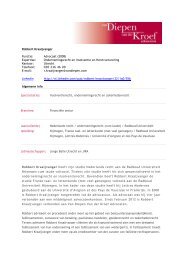Writ of summons - Van Diepen Van der Kroef
Writ of summons - Van Diepen Van der Kroef
Writ of summons - Van Diepen Van der Kroef
You also want an ePaper? Increase the reach of your titles
YUMPU automatically turns print PDFs into web optimized ePapers that Google loves.
415. Moreover, the Dutchbat soldiers – without themselves being endangered – should in anyevent have reported the crimes that they witnessed. Dutchbat wrongfully neglected to doso (see, the UN Report un<strong>der</strong> number 474):‘It is har<strong>der</strong> to explain why the Dutchbat personnel did not report more fully the scenesthat were unfolding around them following the enclave’s fall. Although they did notwitness mass killing, they were aware <strong>of</strong> some sinister indications. It is possible that ifthe members <strong>of</strong> the battalion had immediately reported in detail those sinisterindications to the United Nations chain <strong>of</strong> command, the international community mighthave been compelled to respond more robustly and more quickly, and that some livesmight have been saved. This failure <strong>of</strong> intelligence-sharing was not only limited to thefall <strong>of</strong> Srebrenica, but an endemic weakness throughout the conflict, both within thepeacekeeping mission, and between the mission and Member States.’416. The Report <strong>of</strong> the French Parliament contains an explanation why the observed warcrimes were not reported, namely, out <strong>of</strong> fear that the position <strong>of</strong> the Dutchbat soldiersheld hostage could possibly be endangered (see, page 102, Part 1, the Report <strong>of</strong> theFrench Parliament). That consi<strong>der</strong>ation is gravely culpable. The non-reporting <strong>of</strong> theobserved war crimes also constitutes a breach <strong>of</strong> the right to life, all the more so as suchreporting could have saved the lives <strong>of</strong> many.Humanitarian care417. Human rights include, inter alia, the right to food, accommodation and medical care.This right to humanitarian care is acknowledged un<strong>der</strong> customary law (see, A. Simon,op. cit., page 184). Consequently, Dutchbat was obliged to attend to the humanitariancare <strong>of</strong> the population in the Safe Area (see, A. Simon, op. cit., page 184 et seq.).That Dutchbat evidently did not have available to it sufficient means <strong>of</strong> coercion was –as was shown above – a direct consequence <strong>of</strong> a political consi<strong>der</strong>ation that in partrelated to the desirability <strong>of</strong> being able to procure helicopters, poorly reasoned decisionmaking,the desire to deploy the Air Brigade at all costs and a failure <strong>of</strong> intelligence. TheState <strong>of</strong> the Netherlands cannot argue the absence <strong>of</strong> means against Plaintiff. The UN© <strong>Van</strong> <strong>Diepen</strong> <strong>Van</strong> <strong>der</strong> <strong>Kroef</strong> Advocaten 2007www.vandiepen.com174
















